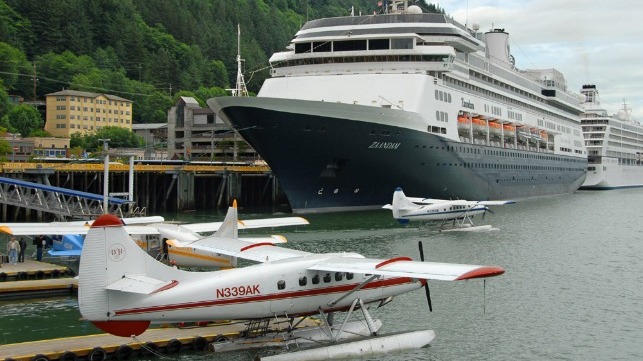FMC Report: Cruise Shutdown Caused Severe Economic Impact to Alaska

Alaska may have suffered the most severe impact from the cruise industry shutdown of all the states in the U.S. according to a new report from Federal Maritime Commissioner Louis Sola. The commissioner has been examining the economic impacts of COVID-19 on specific geographic regions.
Commissioner Sola traveled to Anchorage, Whittier, and Seward where he met with elected officials, port directors, business executives, and labor leaders. While tourism benefits all the Northwestern states, Sola heard from the local officials and businesses that it is one of three pillars of the Alaskan economy.
Alaska’s economy rests on three key industries: energy, fishing, and tourism. Tourism has been a growth industry for Alaska, with the number of visitors increasing 45 percent from 1.5 million in 2010 to 2.2 million in 2019. Alaska had been projecting a record tourism year in 2020 before the onset of the pandemic. Only one small cruise company, UnCruise Adventures, attempted to operate in Alaska, but suspended operations after just days.
“In 2019, twice as many people than the number who live in the state came to Alaska and took a cruise. With the suspension of the cruise season, the economic activity of 1.3 million was wiped out of the Alaskan economy for the year. Under the best of circumstances and in any other state, there would be no disguising the consequences of losing that much revenue. In Alaska, in the context of the cruise industry, the consequences are greatly exacerbated,” said Commissioner Sola.
The report outlines the unique commercial opportunities for Alaska residents and businesses resulting from the cruise industry, ranging from terminal operations to lodging, transportation, food service, and tourist shopping, all of which support the local economy and infrastructure. “The difference between Alaska and other states is that in many locations, the cruise industry may be the only economic driver,” the report notes.
Another economic consequence of the loss of the 2020 Alaska cruise season is the missed direct contribution the cruise companies make to the state. Directly and indirectly, the cruise industry employs thousands of seasonal workers in Alaska who pay rent, shop in grocery stores, eat in restaurants, and purchase services. Also, the cruise lines spend an estimated $300 million annually in purchasing goods and services in the region.
The economic impact on municipalities and the state is also significant, according to the report. Cruise ships operating in Alaska waters, and passengers aboard those vessels, are subject to a variety of fees that finance necessary cruise industry infrastructure as well as environmental conservation efforts that protect areas in which the ships operate. The Commercial Vessel Passenger Tax, the Commercial Passenger Vessel Environmental Compliance Program, and the Ocean Ranger Program, all rely on fee payments tied directly to cruise companies and cruise passengers.

that matters most
Get the latest maritime news delivered to your inbox daily.
The economic impact also extends to Washington and Oregon as the port of Seattle is a homeport to the cruise ships. The report estimates that more than one million individuals fly in and out of the Seattle-Tacoma International Airport to take cruise voyages and notes the tourist income from ground transportation and hotels as well as other service business. The Port of Astoria, Oregon while not a major homeport was also judged to have suffered an economic impact from the lack of the cruise industry.
“While the 2020 season is lost, there is hope for the 2021 season, said Commission Sola. “Companies and port authorities are focusing on the steps necessary to safely return to full operations and to provide cruise customers with the assurances necessary to be confident again boarding a vessel. Better than most, the men and women who are government officials, port executives, and tourism leaders know what is at stake and are doing what they must to limit their losses and welcome back cruise passengers.”
